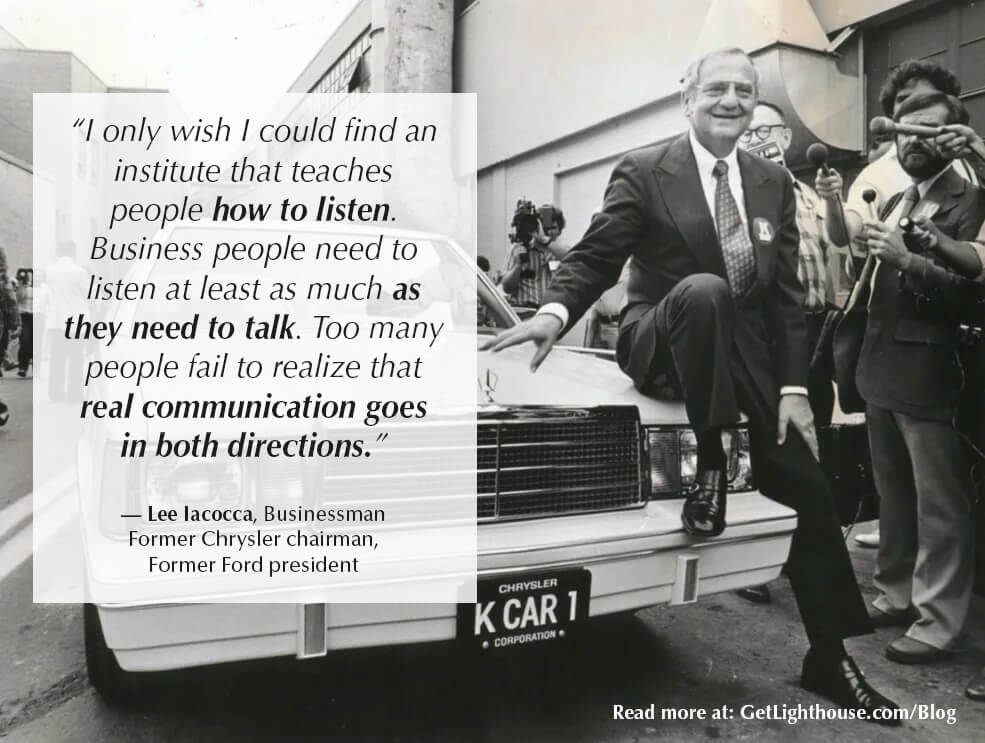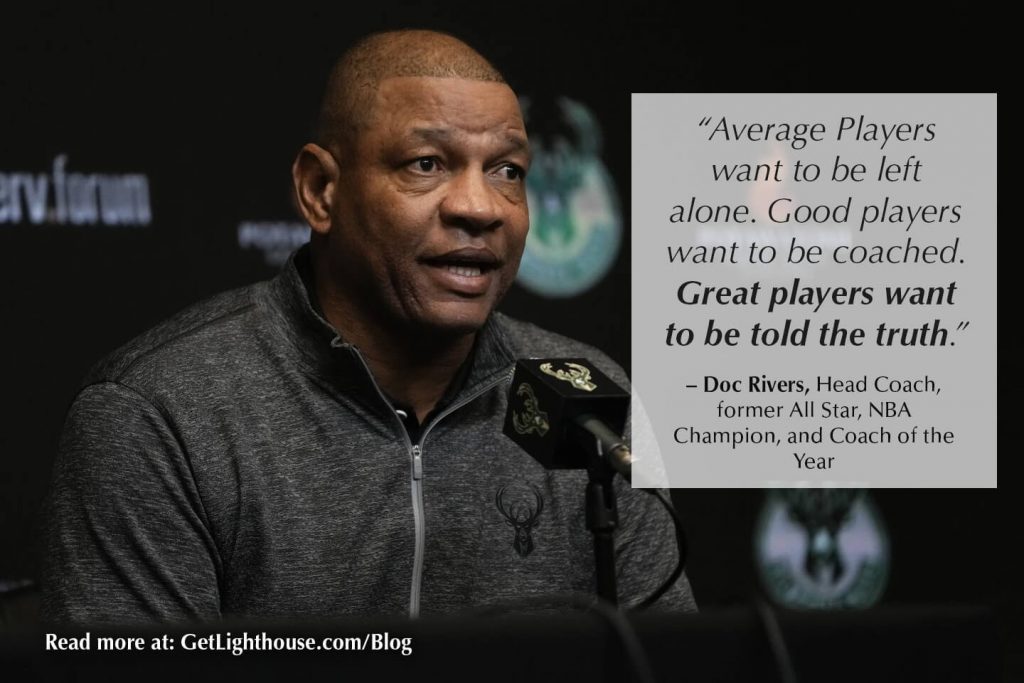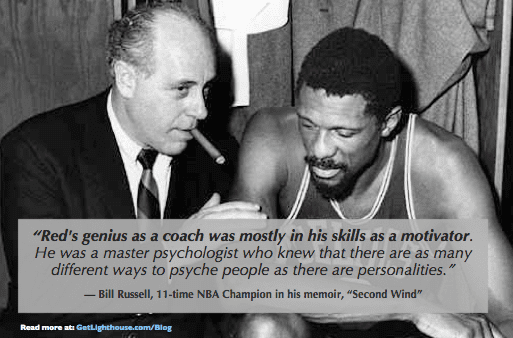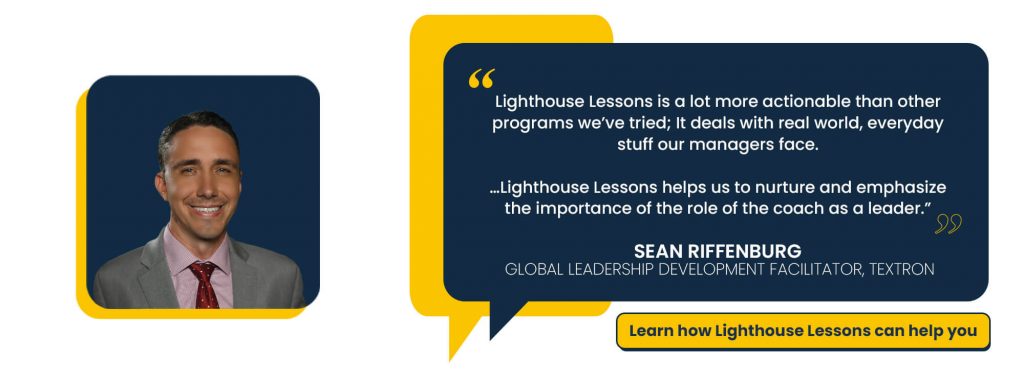"A coach is someone who tells you what you don't want to hear, who has you see what you don't want to see, so you can be who you have always known you could be."
- Tom Landry, former Head Coach of the Dallas Cowboys (1960-1988) and 2X Super Bowl Champion
Coaching is one of those ideas that sounds great in principle, but too often managers can put it off.
How often have these kinds of excuses come to mind for you:
- “I’m really slammed on this project. I’ll help them next week…”
- “My team is doing great, they clearly don’t need any coaching right now…”
- “My team learns from each other, so they don’t need me to coach them…”
- “No one has asked me for coaching, so I don’t need to…”
- “I don’t know how to coach them, so it’s better if I stick to what I’m good at…”
We can all rationalize reasons not to do hard things, yet eventually, it comes back to bite us.
Coaching is definitely one of those cases where understanding and applying fundamental coaching principles is crucial.
Being a Good Coach is a Key Part of Being a Manager
Coaching is an important part of your job as a leader. It makes a bigger impact than you may have realized.
A study by the Human Capital Institute found, “Among organizations with a strong coaching culture, 54% are also classified as high-performing organizations."
While another study found, "80% of people who receive coaching report increased self-confidence, and over 70% benefit from improved work performance, relationships, and more effective communication skills."
It also has other intangible benefits we see every day like:
- Higher performing employees, because you taught them how to do their job well.
- Better retention, because they feel they’re consistently growing and learning (instead of looking for that at their next job)
- Better rapport, because good team members appreciate their manager taking the time to develop them.
Yet, all these benefits only happen if you build the habit of coaching, do it well, and practice it consistently.
That’s why this week’s post focuses on 5 of the most powerful and effective coaching principles you should apply to get all of these benefits and more.
5 Principles of Coaching for Leaders:
- Coaching Principle №1: Ask Insightful Questions
- Coaching Principle №2: Practice Active Listening
- Coaching Principle №3: Give Constructive Feedback
- Coaching Principle №4: Use Your Emotional Intelligence
- Coaching Principle №5: Tailor Your Approach To The Person and Situation

Coaching Principle №1: Ask Insightful Questions
As a leader, one of the most powerful tools you have is the ability to ask great questions. Insightful questions unlock the potential of your teammates by prompting them to think critically, take ownership, and find their own solutions.
As John C. Maxwell wrote in his book Good Leaders Ask Great Questions, "Good questions inform; great questions transform." That happens because as he wrote, "Strategic questions cause team members to pause, analyze a situation, and search for a solution."
And that’s important to recognize: Coaching isn’t about you having all the answers. Getting your team thinking is an important part of good coaching.
So what makes a great question? Here are some tips for asking insightful questions that will get your team thinking:
- Ask Open-Ended Questions Frame questions in a way that can't be answered with a simple "yes" or "no." Use prompts starting with How and What like "What do you think about..." or "How might we approach..." to get them talking and thinking.
- Focus on Growth, Not Judgment Good coaching questions aren't about right or wrong. They should spur learning and finding solutions. For example, instead of "Did you finish your task?", try "What did you learn while working on that task?"
- Keep It Positive Frame questions in a way that's constructive, not negative or critical. Look for questions that shine a light on potential solutions, not just problems and avoid the accusatory tone of questions starting with “Why” like “Why did you do that?”
When you ask insightful, open-ended questions, you create an environment where team members are involved in creating solutions and are empowered to think for themselves. This transfers ownership to them, and helps build their confidence.
When you ask the right questions, you no longer have to have all the answers, and you teach your team to help create solutions that are likely better than what you would have come up with on your own.
By asking the right questions, you'll unlock new ideas and get the best out of your team. And isn’t that what coaching is all about?
Further reading:
- 12 Questions To Ask Your Team To Become A Better Coach At Work — see how just a few key questions can make you the coach your team needs.
- 66 Skip Level Meeting Questions to Improve Your Managers and Engage Your Employees — Use these questions to ask your skip level team members how their manager is doing. This gives you priceless insight into what to coach your managers on.
- 6 Questions You Must Ask When You Start Managing a New Team — start off strong with your new team by asking these crucial questions.

Coaching Principle №2: Practice Active Listening
Asking great questions is powerful, but you also need to listen carefully to the responses you get. Active listening is a critical part of being a great coach and leader who wants to build trust, inspire teamwork, and prevent misunderstandings.
At its core, active listening means setting aside your own thoughts and giving your full, undivided attention to your team member who is speaking. You have to make a focused effort to not just hear the words being said, but to fully understand their complete message.
Here are some practical techniques for demonstrating active listening:
- Minimize distractions and focus entirely on the speaker, making consistent eye contact. Don’t have your phone open or do anything else distracting when you ask.
- Ask follow up questions based on what they said to help them clarify, fully think through their answer, and add detail.
- Paraphrase what you've heard when you think you’ve got it to confirm your understanding ("So it sounds like you're saying...")
- Give them a chance to correct anything you didn’t quite get right when you restated what you heard from them.
When you listen actively, you make the speaker feel truly heard and respected. This builds trust, makes it easier to work together, and means you're much less likely to miss something important to them.
Active listening never goes out of style. Lee Iacocca helped turn around Chrysler in the 1980s by listening more, and Toyota famously built it into their Total Production System around listening to even front line, assembly line employees to help build reliable cars for decades.
And going beyond cars, Richard Branson, founder of the Virgin Group of companies, has famously emphasized the value of active listening with his advice to "Listen more than you talk." This has helped him build successful companies across dozens of different industries.
And the impacts are significant - studies show that active listening can reduce misunderstandings and costly mistakes by up to 40%. It's one of the most powerful tools you have for getting the best out of your team.
Asking insightful questions is a core coaching principle. But those great questions won't spark nearly as much insight if you don't combine them with focused, active listening. When you do ask and genuinely listen, you create an environment of collaboration and ownership.
Further reading:
- For a simple breakdown of practical tips that you can use to become a better active listener, read How Managers Can Be More Effective Listeners

Coaching Principle №3: Give Constructive Feedback
Listening and asking good questions are a great way to start coaching as a leader; they help you get important context, learn where they may need coaching most, and make your team feel heard and part of the process.
Yet, being an effective coach also requires you to give regular feedback - the right way. Constructive feedback doesn't just correct mistakes, it helps your people grow and improve.
In fact, research published in the Harvard Business Review shows that 92% of people believe constructive criticism, when delivered appropriately, improves their performance.
So how do you do that? Follow these key principles for giving feedback:
Be Kind, but Clear: As a leader, it's important to be direct with your feedback so there's no confusion, but you also want to deliver it respectfully. There’s no reason to have malice or give feedback with the intent to hurt them. Frame all your feedback as a desire for them to improve and succeed, while emphasizing that it’s not optional to ignore it.
Focus on Actions: Feedback should be about specific behaviors or outcomes, not them personally. Saying, "Your report was missing key details and had typos" is more constructive than "You're disorganized and sloppy." Personal attacks are discouraging and can put people on the defensive. Focus on the work and what they need to change instead.
Offer Help and Solutions - It’s not enough to identify problems and tell them where they’re not performing well. Good feedback also includes working with them to improve. Suggest concrete actions like places where they can learn and grow their skills, tools that can help them avoid mistakes, as well as your own willingness to check their work or answer questions they may have.
Take Time to Listen, too - Even when you’re giving feedback, make time to listen as well. First, you want to be sure they clearly understand your feedback, which is best done by asking clarifying questions of them. Then, as you work on solutions, involve them in the process by seeing what ideas they have, as well as questions, concerns, or requests related to the solutions you suggest.
The benefit of doing these things is you give your coaching the best chance of being effective. Handled the right way, feedback becomes a positive force that builds trust and pushes your team to grow.
Further reading:
- For a simple 3-step process to provide constructive feedback read: How To Give Constructive Feedback To Improve And Motivate Your Team In 3 Simple Steps
- Avoid the poorly constructed sh*t sandwich by trying one of these more effective ways to give feedback 6 Awesome Ways To Give Feedback To Your Team

Coaching Principle №4: Use Your Emotional Intelligence
As Dale Carnegie wisely shares above, so much of what we do is driven by emotion. That why as a leader, developing strong emotional intelligence skills is critical. It helps you build trust, facilitate growth, and bring out the best in your team.
Best of all, with the coaching principles we’ve covered so far - asking insightful questions, actively listening, and providing constructive feedback - they are all amplified when combined with emotional intelligence (EQ).
At its core, emotional intelligence is the ability to recognize, understand, and manage emotions - both your own and those of others.
It starts with self-awareness. Notice how you're feeling in different situations and how those emotions impact your thoughts and behaviors. The more you understand your internal emotional state, the better you can manage your responses productively instead of reacting impulsively.
This helps you avoid being too confrontational in giving your feedback, or have difficulty listening to the feedback and questions your team brings to you.
But emotional intelligence also requires empathy. This means understanding the emotional perspectives of your team members and others.
Pay close attention to nonverbal cues like body language, facial expressions, and tone of voice. These can provide valuable insights into how someone is feeling that goes beyond just their words.
When coaching or providing feedback, use that empathy to validate the other person's emotions. Simply saying "I understand this is frustrating" or "I can see you're feeling anxious about this" can go a long way. Acknowledging their emotional state makes people feel heard and supported, and also helps you understand if your approaches are working, or making people uncomfortable.
Developing your emotional intelligence takes practice, but it's one of the most powerful skills you can develop as a coach and leader. When you combine it with the other coaching tips for leaders we’re discussing you create the best possible work environment for you and your team.
Further reading:
- Learn more about emotional intelligence in How To Improve Your Emotional Intelligence To Become A Better Leader
- If you're struggling with your self-awareness, keep working at it and better understand it with our post, The Hardest Skill Of All For Managers To Learn And Build
- Dale Carnegie’s How to Win Friends and Influence People is one of our all time favorite books and covers many soft skills that will boost your EQ.

Coaching Principle №5: Tailor your approach to the person and situation
Being a truly effective coach requires one more key capability: the ability to tailor your approach to each unique person and situation.
There's no such thing as a "one-size-fits-all" coaching style that works for everyone.
The reality is, one-size-fits-all actually means one-size-fits-none. Every individual has different personalities, experiences, motivations, and preferred learning styles. Situations also vary enormously in complexity and context.
An inflexible, generic coaching method simply won't resonate or drive real impact.
The best coaches avoid taking a blanket approach. Instead, they first seek to understand the specific situation and person involved, then adapt their style accordingly.
Here’s how to tailor your coaching approach:
1) Understand their Task Relevant Maturity
Average managers are either micro-managers or super hands off. Great managers know that you should be more hands on or hands off depending on their task relevant maturity.
This means you can trust people and be hands off for things your team member is great at, but regardless of their skill in other areas, you should be more supportive and coaching-oriented when they take on new and challenging tasks.
The best coaches know that even the best people want coaching and support sometimes. Knowing when is what can make you a great leader.
2) Know their motivations and preferences
You'll also want to adapt your approaches to the individual's motivations, values, and preferences for receiving feedback.
Some people are energized and respond well to direct communication, while others prefer a softer and more conversational approach. Your extroverts are likely fine with on the spot, impromptu discussions, while your introverts will want time to consider your questions and feedback before they have their own thoughts.
That’s why it’s so important to take the time to understand the style that fits each of your team members. Doing so will make your coaching more effective. It’s the approach that Red Auerbach used to win 9 NBA Championships as the coach of the Boston Celtics, and was so memorable that his star player Bill Russell still remembered it decades later.
The bottom line is that effective coaching is never one-dimensional. By tailoring your approach every time, you'll ensure you’re coaching them on the right things, and that it always lands with them. This is how you become a great leader who earns the respect and loyalty of your team.
Further Reading:
- To master tailoring your coaching approach based on an individual's skill level and experience for a particular task or situation, dive full into the concept of "Task Relevant Maturity"
- If you're struggling to motivate your team, get some actionable, low cost ideas here: How To Motivate Your Employees: The Essentials To Unlocking The Power Of Motivation
Final word
Coaching is how you get the best from your team. But real coaching isn't just telling people what to do.
It means asking thought-provoking questions and truly listening. It requires giving feedback that helps your people improve, not criticizing them. And it involves adapting your coaching style for each unique person and situation.
Mastering these coaching principles will help you build stronger connections with your team, while helping them grow in the most important ways. This not only sets them up for career success, but it also gives you and your team the best chance of delivering great results for your organization.
Want to become a great coach, building on the principles we taught you today?
Lighthouse Lessons: The Coach’s Clinic is a 12 week program that helps you build the most important skills in coaching: giving feedback that leads to improvement and praise that deeply motivates.
You can learn more about the program, and sign your group up here.





